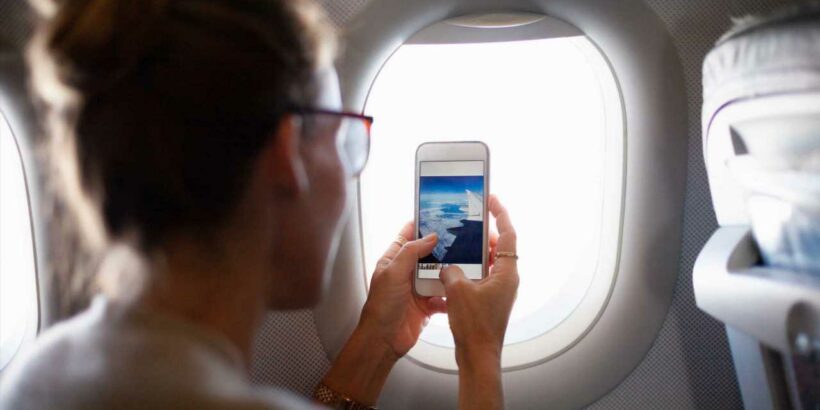THERE are times during a flight when passengers know they shouldn't use their phones.
Making calls and sending texts aren't permitted once the plane has taken off but there are other phone functions that could now get passengers in trouble.
Some airlines have put a new line in its "conditions of carriage" – the code of conduct passengers agree to whenever they purchase flights – banning the taking of photos and filming people without permission.
Australian carrier Qantas has now told people that they have to ask before filming of photographing flight attendants or other passengers.
It reads: "Seek consent before filming or photographing Qantas Group staff, contractors or other customers."
It isn't clear what the punishment would be, but it is likely that passengers would be politely asked to stop.
Read More on Airlines

Secret airline you won't have heard of – and destinations are classified

Ryanair passengers forced to pay £21 hidden fee – or face huge airport queues
Qantas is the latest airline to add a specific line about such phone use into their conditions of carriage, but others have got similar lines in there too.
In fact, airlines in America have had similar rules in place for years now.
American Airlines, Delta, and United all state that passengers have to seek consent before taking pictures of anyone on board.
In 2013 a passenger was kicked off a United flight for failing to do just that.
Most read in News Travel

Little-known bathroom activity even flight attendants don’t know about

Everyone’s asking the same thing over rude family with screaming kids on flight

Europe’s oldest tourist site that’s been attracting visitors for 40,000 years

How I skied from France to Italy in one morning — even beginner could do it
The airline said at the time: "Separately, we welcome customers to record their personal experiences on board provided they don't take photos or videos of customers and crew members without their consent.
"This is both a security and service measure we take that also respects the privacy of other customers. United's policy was implemented in 2010."
However, the rules have made their way over to the UK too, with Ryanair joining in with the regulations.
They also state that people must seek permission when taking photos in the airport.
Their rules read: "Recording or photographing our personnel, whether at the airport or onboard the plane, without their consent is strictly prohibited.
"Only recordings or photographs personal to You may be permitted."
Elsewhere, Virgin Atlantic's rules prohibit "the taking of photographs or videos of ground staff, crew or passengers".
Airline staff are within their rights to prevent people from boarding their flight if they're caught breaking these rules.
Continued rule breaking could result in names being added to no-fly lists, meaning those passengers won't be allowed to fly with those airlines again.
Taking photos in certain areas of airports could also land passengers in trouble.
The security area and the tarmac are two areas in particular where people are told to put their phones away.
This is to prevent photos of airline security or general operations getting out into the public.
Doug Drury is Head of Aviation at CQUniversity in Australia.
He told Stuff NZ: "Such restrictions are carryovers from the changes to airport security following the September 11 2001 terrorist attacks.
"Security teams change their processes frequently to prevent having any identifiable patterns that could be used to create a security breach."
Read more on The Sun

I lost £635 by selling an iPhone on eBay after buyer claimed device was fake

Asda trick to get discounts revealed as customer bags £10 of shopping for 10p
Meanwhile, these are three rules passengers should follow when on board planes.
And this major hand luggage rule change is coming into force at airports next year.
Source: Read Full Article


